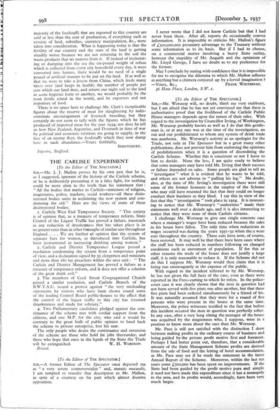THE CARLISLE EXPERIMENT
[To the Editor of THE SPECTATOR.] SIR,—Mr. J. J. Mallon proves by his own pen that he is, as I suggested, ignorant of the history of the Carlisle scheme, or he is deliberately presenting it in a false light, for nothing could be more alien to the truth than his statement that : " All the bodies that matter in Carlisle—ministers of religion, magistrates, police, teachers, social workers—all these disin- terested bodies unite in acclaiming the new system and con- demning the old." Here are the views of some of these disinterested bodies.
1. Carlisle West End Temperance Society. " This society is of opinion that, as a measure of temperance reform, State Control of the Liquor Traffic has proved a failure, inasmuch as any reduction of drunkenness that has taken place is in no greater ratio than in other boroughs of similar size throughout England. . . . We are further of opinion that the system of separate bars for women, as introduced into Carlisle, has been instrumental in increasing drinking among women."
2. Carlisle and District Temperance League passed a resolution condemning the system from a temperance point of view, and a declaration signed by 35 clergymen and ministers and more than 16o lay preachers within the area said : " The Carlisle and District Management has proved a failure as a measure of temperance reform, and it does not offer a solution of the great drink evil."
3. The members of Cecil Street Congregational ChuiCh passed a similar resolution, and Carlisle Branch of ' the B.W.T.A.U. issued a protest against " the very misleading statements by visitors who have been shown round some of the leading Control Board public-houses to the effect that the control of the liquor traffic in this city has lessened drunkenness and made for sobriety."
4. Two Parliamentary candidates pledged against the con- tinuance of the scheme met with cordial support from the citizens, and one M.P. for the city, who said it would be contrary to the great bulk of public opinion to hand back the scheme to private enterprise, lost his seat.
The only people who desire the continuance and extension of the scheme are those who hold fat jobs thereunder, and those who hope that once in the hands of the State the Trade


























































 Previous page
Previous page